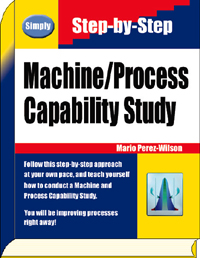
 |

|
|

|

|

|

|

|

|

|

|

|

|

|
Machine/Process Capability StudyA Five-stage Methodology For Optimizing Manufacturing Processes
by Mario Perez-Wilson |
| The Machine/Process Capability Study book was the original book that defined the M/PCpS Methodology for Process Characterization. It is currently an introduction to the M/PCpS Methodology. This book has evolved into a five volume set of over 1,800 pages. |
| Book Description | Benefits |
|---|---|
| The purpose of this book is to serve as a single source of reference to those individuals who are involved in the implementation of statistical methods (Statistical Process Control and Design of Experiments) in manufacturing. It presents a standard methodology for conducting machine and process characterization studies. The methodology has been designed to provide industry with a standard approach for studying processes, and enable them to produce within specifications.The Machine/Process Characterization Study methodology, M/PCpS, presents the steps necessary to achieve process capability in sequential order. It is divided into five progressive stages: 1) Process Delineation, 2) Metrology Characterization, 3) Capability Determination, 4) Optimization, and 5) Control. Prior to introducing each stage, necessary background information is presented. This information usually consists of problem solving tools and/or statistical techniques. Each stage is then thoroughly explained and broken down into further steps. Each step is then defined and described in detail using a "real world" manufacturing process example.
The M/PCpS Methodology has received global recognition and has become the standard approach in the achievement of Six Sigma Quality. |
|
 |
| Availability | M/PCpS Methodology |
|---|---|
|
An M/PCpS study is a stepwise analytical investigation using a standardized methodology for determining the current capability of a manufacturing process and for identifying, reducing or eliminating its major sources of variation. The M/PCpS methodology presents a systematic and logical approach to characterizing and optimizing machines and processes. For that purpose, it is divided into five stages.
Stages of the M/PCpS Methodology
|
| Factum | |
| This is the Original book used to achieve Six Sigma at Motorola. This book is currently used as a training material for an introduction to the M/PCpS Methodology. | |
| Home | | ASC | | M/PCpS | | Six Sigma | | VRI | | Training | | Books | | Software | | Articles | | Clients | | Email Us |
| © Copyright, 1995-2025, Advanced Systems Consultants. All Rights Reserved. Scottsdale, Arizona 85261-5257 |